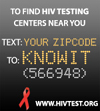The sense of family in the Latino community is so strong academics have coined a term for it: familismo. But for Latinos, family includes the village, the community at large. Dr. Garth Graham, a physician who heads the Office of Minority Health (OMH) at the U.S. Department of Health and Human Services, thinks that the idea of familismo or la familia primero (family first) is a key factor, together with the community, for helping Latinos in their fight against HIV/AIDS.
"La familia primero conveys a strong sense of family and community commitment that drives a lot of people in the Latino community to take care of themselves and others," he says. "It is a very strong incentive to get people to reduce risky behaviors."
And reducing the risk for HIV is the theme of National Latino HIV/AIDS Awareness Day, an annual observance that serves to educate Latinos about the impact of HIV/AIDS in their communities. NLAAD is held each year on October 15.
OMH offers resources to help Latino families and communities in the fight against HIV/AIDS. Those resources are available at www.omhrc.gov/espanol or www.aids.gov.
Graham has seen firsthand the way family values play out in the lives of Latinos in the United States. As an immigrant from the Caribbean himself, Graham understands the cultural issues and pressures-and the difficult choices-that so many Latinos face when it comes to taking care of themselves.
"Back when I was in medical school, I worked in a community health center where we saw a large proportion of African Americans and Latinos who were affected by the HIV/AIDS epidemic," Graham says. "I have never forgotten one patient I treated – a Latina in her early 30s who already suspected that she was HIV-positive, because the man she lived with was an injection drug user and engaged in a lot of risky behaviors."
"There was a great imbalance in that household dynamic. Because of some cultural issues, including poverty and immigration status, she felt restricted in her ability to protect herself from her partner. But she finally came into the clinic because she had two small children. She came to the awareness that she needed to be doing things for her children, even if she wasn't able to do them for herself."
And that, Graham says, is the key to addressing the growing rate of HIV among Latinos-and among Latinas, in particular. "It is important for us to understand how we take care of each other and the community," he says. "When we look at the growing rate of HIV among Latinas, I always think back to that woman and realize that, because of her family, she was motivated to start taking care of herself. This is what we need people in the Latino community to hear – when you take care of yourself; you take care of those who love you as well."
OMH works to get that message across through its community partners around the nation. "Our partners help us convey the importance of HIV testing, care and treatment, and risk reduction," Graham says. Risk factors for HIV/AIDS among Latinos are as diverse as the Latino community itself, which makes it more challenging to develop HIV-prevention strategies.
In recognition of that fact, the OMH Resource Center works to provide technical assistance to a number of groups, offering bilingual support and a hotline where people can call to get information on HIV prevention, testing, and treatment. "We work with a lot of community-based organizations to raise awareness about HIV and let people know about resources and options," Graham says.
But at the end of the day, he says, la familia primero is one of the Latino community's most potent weapons against HIV/AIDS. "We can deal with differing cultural values, raise awareness about HIV, and work to decrease the stigma associated with it-but, in the end, it will be the importance of community and family that drives people to make better choices for themselves. Taking care of each other gives us permission to take care of ourselves."
Office of Minority Health
1-800-444-6472
www.omhrc.gov


